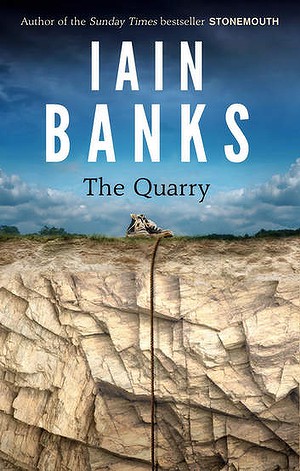It’s difficult to find a more skilled master of context than was Iain Banks. With simple flashes of the pen he was able to sketch out the undercurrents of a myriad of stories within a single narrative.
The main focus of the story is upon Kit, a young man with near-autistic social difficulties, as he copes with his father’s impending death from cancer.
Truly ironic then that The Quarry was published not long after Bank’s own death from cancer, a fitting final testament to a prolific career of incredible works, creating a context that renders the nature of the novel that much more relevant.
Set in rural England in a dilapidated house due for demolition to extend the local stone quarry, the narrative brings together the long-time friends of Guy, Kit’s dying father, in one final reunion before he passes.
The rest of the cast, a varied collection of prominent business people and social misfits, arrive with the intention of not only enjoying the last of the companionship their ill friend can provide, but also to locate a possibly incriminating videotape recorded when the group were young and reckless. Hol, almost a stand-in mother for young Kit, seems to be hiding something important from him. Paul is willing to pay for first access to the mysterious video. Ali and Rob are using the time away to explore their fracturing relationship. Haze is the drug addled beatnik he always was. Pris is anxious about how the group will respond to her younger boyfriend. And Guy is emotionally abusive in the face of his terminal illness.
The story evolves to include each character’s personal stories, providing material that fleshes out the history of the house and its occupants. Revealing tantalising hints of hidden agendas and further stories never to be told.
Throughout the novel there are questions constantly on the verge of being answered. Who is Kit’s real mother? What will happen after his father dies? Could it really be a sex tape that everyone is looking for?
In true Banks Style, the writing is immaculate and imaginative; setting vivid scenes and believable characters. Dialogue is rich and realistic, often humorous or painfully realistic. And the plot moves at the perfect pace for such a novel; fast enough not to get bogged down in detail, but steady enough that every element gets its appropriate print time.
There is not much more that can be said about this wonderful piece that could give it justice without spoiling the pleasure. As the last work of a great man it is one of his greatest; not the galaxy spanning epics of his science-fiction work, nor the satirical or depressing worlds of his literary work, but something more important.
The Quarry is Iain Banks’s final footprint on this earth. It will remind us of what a great man can do, even at the very end.



































